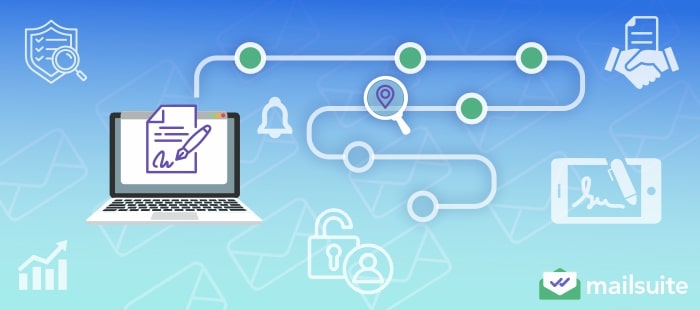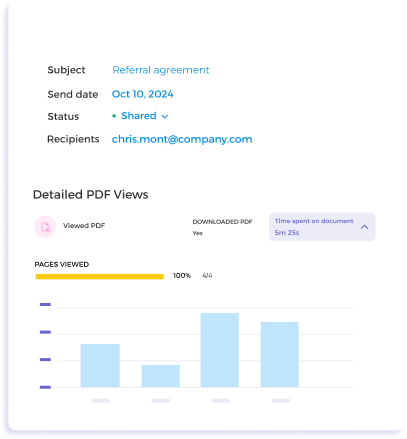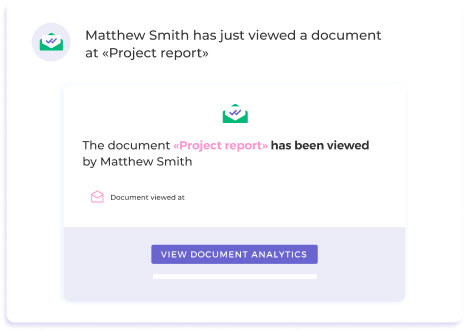
Contracts are a key part of almost all business relationships as they outline the rights, responsibilities, and obligations of each party involved. Whether working with clients, suppliers, or partners, you’ll sign different contracts while running your business.
However, while signing a contract can be an important milestone, monitoring it as it progresses through its lifecycle is also important. Without this, you may not know where a contract is in its process, leading to stalled deals, deviation from terms, or worse.
But how do you track contracts as they progress through their lifecycle? This guide will answer this question and more.
What is Contract Tracking?
Contract tracking is the process of monitoring contracts throughout their lifecycle.
Contracts go through different phases. These include:
- Preparation: The parties decide to enter into an agreement and set objectives for the contract.
- Drafting: One party prepares the contract document with all necessary information, including clauses, terms, and conditions.
- Review and negotiation: The other party reviews the contract, and both parties negotiate until they arrive at mutually acceptable terms.
- Approval: Both parties sign the contract document to show they accept its terms and are willing to be bound by them.
- Storage: Each party should have a copy of the signed document and store it in a secure yet accessible location for easy reference.
- Execution: Both parties must now complete the contract according to its terms.
- Amendments: Parties to the contract can negotiate changes to the contract.
- Auditing: Parties will periodically review contract provisions to ensure execution complies with contract terms.
- Renewal or expiration: At the end of the contract, the parties can decide to renew it, negotiate a fresh contract, or terminate it.
Contract tracking involves identifying where the contract is in its lifecycle and determining whether any action is needed to progress it. It also involves keeping track of important dates, milestones, and deliverables to ensure that both parties fulfill their agreed-upon terms.
Key Elements of Contract Tracking
Key tasks involved in contract tracking include:
- Contract approval: After creating the agreement document, the parties need to review and sign it before it becomes a binding contract. Contracts can be signed electronically to reduce approval times. With Mailsuite, you can send the document to the other party via email and have them sign it electronically with only a few clicks.
- Compliance tracking: Ensure the contract terms comply with applicable regulations and internal policies. Compliance tracking also involves tracking any necessary changes to the contract to ensure it remains compliant.
- Access control: Ensure that contracts (and the confidential information therein) are protected from unauthorized access. This involves controlling who can view, edit, or approve the contract document.
- Obligations: Track both parties’ obligations, such as contract key dates and milestones, service levels, and deliverables, to ensure that both parties perform their responsibilities.
- Audit trail: Keep a record of all communications regarding the contract, including the draft, approvals, and any contract modification. This shows every action on a contract for accountability.
- Notifications and alerts: Set reminders to alert you and other relevant stakeholders about critical contract dates, obligations, actions, and risks.

Track contracts in Gmail
See when your contract is viewed and signed
How Does Contract Tracking Differ from Contract Management?
Contract tracking and contract management are closely related terms, but they differ. Tracking contracts involves monitoring the status of a contract during its lifecycle. It focuses on ensuring that actions related to the contract are executed properly and on time.
Contract management is the broader, more comprehensive administration of contracts from creation through execution and close-out. It involves the entire process of drafting, negotiating, approving, tracking, and ensuring compliance with a contract’s terms and conditions.
Importance of Contract Tracking
Here are specific reasons why tracking contracts is important.
Ensures Compliance with Contract Terms
Contract tracking helps remind stakeholders of critical obligations, deadlines, and performance milestones outlined in the contract. This ensures that both parties to the contract adhere to the agreed-upon conditions and any deviation from those conditions is quickly identified and addressed.
Prevents Missed Deadlines
Contracts usually come with important dates (such as delivery milestones, payment schedules, renewal deadlines, and expiration dates). An organization can use a contract tracking system to monitor these dates to ensure they do not miss anyone.
This helps organizations prevent missing deliverable deadlines and incurring late penalties, or missing renewal deadlines and having contracts automatically roll over on existing terms, missing the opportunity to renegotiate better conditions. Mailsuite notifies you if your time-sensitive email isn’t opened within 24 to 72 hours, which helps ensure clients or suppliers don’t miss critical messages that are necessary to ensure tasks are complete before the deadline.
Improves Risk Management
Actively tracking contracts helps organizations spot potential risks early. These can include clauses related to compliance, delivery, or legal obligations that could be problematic if not fulfilled.
For example, if an organization is failing to meet an obligation or if a deadline is approaching without the organization taking the necessary action, they should be alerted before the deadline passes. This allows them to take corrective action before the issue escalates into a contract breach or legal dispute.
Enhances Operational Efficiency
Tracking contracts in real time enables organizations to plan operations more effectively. By staying on top of key dates and milestone deadlines, businesses can allocate resources strategically and ensure deliverables are met on time, focusing support where it’s most needed.
Improves Transparency and Accountability
Contract tracking provides clear visibility into the status and progress of contracts.
First, many contract tracking systems store contract-related information in a centralized repository. This ensures that everyone accessing the system will have the same information and that stakeholders (such as contract owners, contract managers, legal teams, and more) are on the same page regarding contract terms and milestones.
Contract tracking also makes each stakeholder aware of the tasks they are responsible for and the deadlines they must meet. This clarity ensures that everyone knows their roles in executing a contract. This leads to increased accountability, as teams are less likely to play the blame game and shift responsibility for delays.
Supports Legal and Financial Audits
Contract tracking helps maintain an organized record that auditors (legal, financial, or internal) can use for their work.
With contract-related documents centralized, auditors can easily pull up relevant contract documents during the audit process. Also, when a contract lifecycle management solution offers an audit trail, it records every action on a contract, such as when it was created, approved, modified, and viewed. This traceability makes it easy for auditors to track the history of decisions and actions on a contract.
How to Track Contracts with Mailsuite
Mailsuite is a leading email marketing tool with unlimited email tracking, personalized mail merge, PDF tracking, email certificates, and much more. While not a dedicated contract management software, it is excellent for different aspects of contract tracking and provides visibility into contract status and progress.
Here’s how Mailsuite can help you track your contracts efficiently:
Reduces Contract Approval Times
Mailsuite allows contracts to be signed electronically, significantly reducing the time it takes to review, sign, and finalize contracts.
Traditional methods of finalizing contracts take time, which can be problematic for time-sensitive contracts. For example, it can be difficult to find a mutually convenient time to physically meet for contract signing, while mailing printed contract documents for signing is not efficient because of postal delays and potential security issues through lost mail.
Mailsuite’s ability to facilitate electronic signatures streamlines the contract approval process, reducing the time it takes to finalize contracts. After preparing the digital contract document, you can email it to the other party and request they sign it electronically via Mailsuite.
They will receive it almost immediately, and after reviewing it, they can add their signature electronically with only a few clicks, finalizing the contract. The signing process is embedded directly into the email workflow, making it incredibly easy for the signer.
Offers Secure Document Sharing
Mailsuite offers access control features that ensure secure document sharing over email.
Since contract documents often contain sensitive information, it’s important to ensure privacy when sending them to other parties via email. Mailsuite’s access controls can help you with this, allowing you to send contracts securely right from your inbox.
Mailsuite allows you to set an expiration date for accessing your document. This ensures that your document is only available for a specified period because once the time you set is reached, the recipient can no longer access the document.
This feature ensures the integrity and security of contracts by mitigating the risk of unauthorized access after the contract has been signed or is no longer valid. The feature also helps track compliance by making it easier to determine that a contract was finalized within the required timeframe.
Mailsuite also allows you to disable document downloads. When you disable document downloads, the recipient cannot download a copy of the document, meaning the document cannot be shared without your permission.
Offers Comprehensive document analytics
Mailsuite’s document tracking capabilities allow you to analyze how recipients interact with your contract documents, helping you make data-driven decisions.
Mailsuite lets you track email opens and document views. After sending a document for review and approval, you won’t have to wonder whether or not the person has seen it as with Mailsuite, you can see whether your receiver has opened the email and viewed the document.
This feature includes viewing when recipients opened the document and how many times. Mailsuite even offers a page-by-page breakdown showing how much time the recipient spent on each page of your contract.
This can help you understand how engaged your recipients are with your contract. You’ll see whether the recipient is fully reviewing the document or simply skimming through it, and this helps you create more impactful follow-ups.
For example, are particular pages of the contract getting huge attention? That may indicate that the recipient is finding those places confusing. You may then take note of these areas for further clarification.
Also, do you see that the recipient skimmed over sections with important clauses? You may want to reemphasize these clauses in further discussions before they become bottlenecks later in the contract lifecycle.
Streamlines Your Workflow
Mailsuite makes it easy to integrate contract tracking into your existing workflow, helping you save time.
Rather than requiring a separate contract management software, Mailsuite allows you to track and manage contracts directly through the same Gmail interface you already use to communicate with internal teams, partners, clients, and vendors.
After emailing the document, you can immediately begin tracking its status (including whether it has been opened, viewed, or signed) within Gmail.
This integration allows you to incorporate contract tracking into your regular workflow. And this saves you time switching between your email and contract management solutions.

Track Document Opens in Real-Time
Track PDF opens, document downloads, and more
Best Practices for Effective Contract Tracking
Follow these best practices to maximize the value of your contract tracking efforts.
Stay Proactive
Stay proactive throughout the contract lifecycle. Proactivity involves actively monitoring and responding to the needs of a contract before issues arise instead of waiting until problems occur and then addressing them.
For example, for pre-signature contract management, you may want to ensure that the contract terms are well-defined to prevent any confusion that may require clarification and stall approval.
Also, you may want to use Mailsuite’s page-by-page document analytics to track how recipients engage with your contract and identify sections they may be finding confusing. You can then proactively reach out to clarify these areas instead of waiting for a formal query. This prevents unnecessary back-and-forth, facilitating contract approval.
For post-signature contract management, proactively maintain an organized record of signed contracts for auditing and compliance purposes.
Automate Alerts and Reminders
Contract automation streamlines the contract management process, and implementing automatic alerts and reminders is a simple way to automate. Automating alerts ensures that key actions are not overlooked, deadlines are met, and important follow-ups are executed timely.
Mailsuite real-time notifications will alert you when your recipient takes action on the document. This helps you know the status of your contract and craft effective follow-ups to progress it.
Monitor Contract Performance Regularly
Don’t wait until the end of a contract to assess performance. Regularly check whether contractual obligations are being met.
Contracts include key deliverables, milestones, and specific performance targets that both parties must meet within set timeframes. Monitor these regularly to ensure the contract is progressing as planned.
This can help you identify issues early and ensure that parties stay accountable.
Collaborate Across Teams
Contracts usually involve multiple departments, such as legal, finance, operations, procurement, and sales. For this reason, effective contract management requires that different team members collaborate effectively.
Use collaboration tools like Slack within your contract tracking system to ensure effective communication between all stakeholders. When using collaboration tools, consider setting up an internal channel where members from each department can share updates, ask questions, and work together in real time.
Also, establish clear lines of communication between teams so that everyone involved in the contract knows who to contact for specific issues.
Takeaway: Track and Manage Contracts Effectively with Mailsuite
Contract tracking offers many benefits, including ensuring compliance with contract terms, preventing missed deadlines, improving risk management, enhancing operational efficiency, and more.
Tracking your contracts doesn’t have to be difficult. And you don’t have to go searching for the best contract tracking software either. Tools like Mailsuite can handle many aspects of contract tracking, helping you ensure that your contract progresses well. It facilitates e-signature for quick contract approvals, offers detailed document tracking and analytics, and more.
Ready to take control of your contracts with effective contract tracking? Install Mailsuite today!
